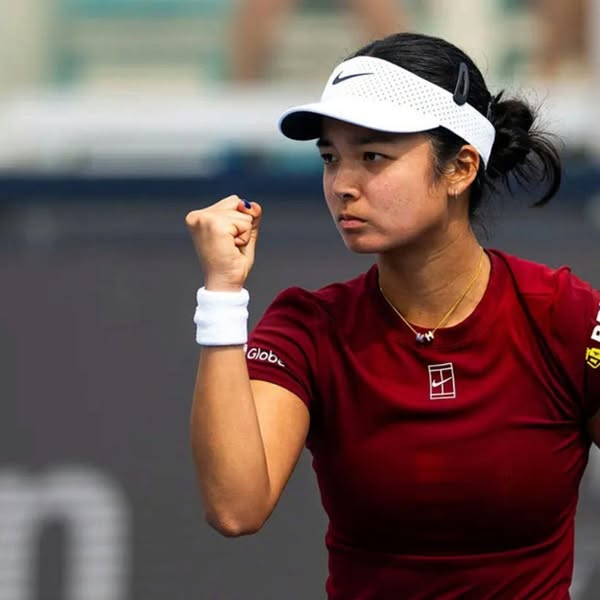Introduction
In the ever-competitive world of professional tennis, rising through the ranks is no small feat. For Alex Eala, the young Filipino sensation, her breakthrough has finally arrived. After securing her maiden WTA Tour win, Eala has officially climbed to World No. 61, marking a career-high ranking and solidifying her place among the sport’s rising stars.
This achievement is more than just a personal milestone—it is a monumental moment for Philippine tennis. As Eala’s name becomes synonymous with grit, determination, and global recognition, fans, analysts, and aspiring athletes alike are asking: What does this mean for her career? How far can she go? And what impact will this have on tennis in the Philippines?
In this comprehensive blog, we’ll explore Alex Eala’s remarkable journey, the significance of her WTA breakthrough, what her new ranking represents, and the frequently asked questions that capture the excitement around her ascent.
Alex Eala’s Journey to the Top 100
From Junior Prodigy to WTA Breakthrough
Alexandra “Alex” Eala has long been considered a tennis prodigy. As a junior, she made waves by winning the Australian Open Junior Doubles Championship in 2020 and later the French Open Junior Doubles title in 2021. These achievements placed her on the global tennis map early in her career.
Unlike many junior stars who struggle to transition into the professional circuit, Eala approached the WTA stage with patience and persistence. Training at the prestigious Rafael Nadal Academy in Spain, she has honed her skills under world-class mentorship, learning the discipline and tactical edge required at the highest level.
Her persistence finally paid off with her first WTA main draw victory, which propelled her to World No. 61—a monumental leap that signals her readiness to compete with tennis’s elite.
The Significance of Reaching World No. 61
Breaking Barriers for Philippine Tennis
To put Eala’s achievement into perspective, no Filipino woman has ever reached this level in WTA rankings before. Tennis has long been dominated by powerhouses like the United States, Spain, and Eastern European nations. For an athlete from the Philippines—a country with limited tennis infrastructure and global recognition in the sport—to break into the top 100 is groundbreaking.
- Historical Context: Prior to Eala, Filipino tennis players rarely made headlines beyond regional tournaments. Eala’s climb to No. 61 sets a new benchmark.
- Inspiration for Future Generations: Her journey underscores the message that talent, when combined with hard work and the right support, can overcome systemic barriers.
- Boost for Tennis in the Philippines: Her success is expected to attract new sponsorships, better grassroots programs, and an increased interest in tennis across the nation.
Key Highlights of Her Maiden WTA Victory
- Opponent: Eala’s first WTA win came against a seasoned competitor, showcasing her ability to handle pressure.
- Playing Style: Her aggressive baseline play, powerful forehand, and improved serve stood out as weapons.
- Mental Toughness: Eala maintained composure during critical points, reflecting her maturity beyond her years.
This combination of skill and poise signals that Eala is not just a one-time victor but a consistent threat on tour.
Frequently Asked Questions (FAQs)
1. What does Alex Eala’s World No. 61 ranking mean?
Reaching World No. 61 places Eala among the top tier of professional tennis players worldwide. It means she is now eligible for direct entry into major WTA tournaments, including Grand Slam main draws, without having to go through qualifiers.
2. How old is Alex Eala?
Born on May 23, 2005, Alex Eala is only 20 years old in 2025. Her youth means she has many prime years ahead, with enormous potential for growth.
3. Has any other Filipino tennis player achieved this level?
No. Eala is the highest-ranked Filipino woman in WTA history. On the men’s side, Felicisimo Ampon, who competed in the mid-20th century, was the most notable Filipino player, but his achievements predated the ATP rankings system.
4. What’s next for Eala after her maiden WTA win?
Her immediate focus will be on consolidating her position in the top 100, performing consistently in Grand Slams, and gaining experience against top-10 players. Long-term, the goal is clear: break into the Top 50, then Top 20, and eventually challenge for titles.
5. What challenges does she face moving forward?
- Physical Demands: Competing at the WTA level requires superior fitness and recovery strategies.
- Consistency: One win is a milestone, but maintaining form against seasoned professionals is the real test.
- Pressure of Expectations: As a national icon, the spotlight can add emotional weight, especially during losses.
Why Alex Eala’s Success Matters Globally
Representation Beyond Borders
Eala’s story is not just about one athlete—it’s about representation. In a sport that often highlights players from wealthier nations, her ascent proves that talent can emerge from unexpected places. She has become a symbol of diversity in global tennis, inspiring not only Filipinos but also athletes from developing nations.
Economic Impact
Her victories attract attention from sponsors, broadcasters, and investors. According to industry trends, players who break into the top 100 can increase their endorsement value by 50–70%, boosting both their career earnings and the visibility of the sport in their home countries.
Social Impact
For young athletes in the Philippines, Eala’s success is tangible proof that dreams are achievable with hard work, even without the same infrastructure available in tennis-dominant nations.
Lessons from Alex Eala’s Journey
1. Consistency Builds Breakthroughs
Eala’s rise did not happen overnight. Years of training, setbacks, and small wins led to her WTA breakthrough.
2. The Value of Mentorship
Training at Rafael Nadal’s academy provided not just technical skills but also mental toughness—a key ingredient in her success.
3. National Pride as Motivation
Carrying the hopes of a nation can be heavy, but for Eala, it has become fuel to perform at the highest level.
What This Means for Philippine Tennis Development
- Grassroots Programs: Expect a surge in tennis academies and junior programs nationwide.
- Government Support: With Eala’s success, local sports agencies are likely to invest more in tennis infrastructure.
- International Exposure: More young Filipino players may be scouted for training abroad, increasing global competitiveness.
The Road Ahead: Can Alex Eala Become a Grand Slam Champion?
While it is too early to predict definitively, the ingredients for success are clear:
- Talent and Skill: Already proven.
- Work Ethic: Evident from her training regimen.
- Experience: Building rapidly with each tournament.
If Eala continues her upward trajectory, breaking into the Top 30 within the next two years is realistic, with Grand Slam quarterfinal or semifinal appearances possible within five.
Conclusion
Alex Eala’s rise to World No. 61 after her maiden WTA win is more than a personal triumph—it is a historic breakthrough for Philippine tennis and a beacon of hope for aspiring athletes worldwide. At just 20 years old, her potential is limitless.
Her story is one of resilience, discipline, and ambition—qualities that resonate far beyond the tennis court. For the Philippines, her success signifies not just sporting achievement but a cultural milestone that inspires the next generation to aim higher.
As the world watches Alex Eala’s journey unfold, one thing is certain: this is only the beginning of a remarkable career. And for fans, sponsors, and fellow athletes, now is the time to rally behind her, because the rise of Alex Eala is a story that could redefine the future of tennis in Southeast Asia.



